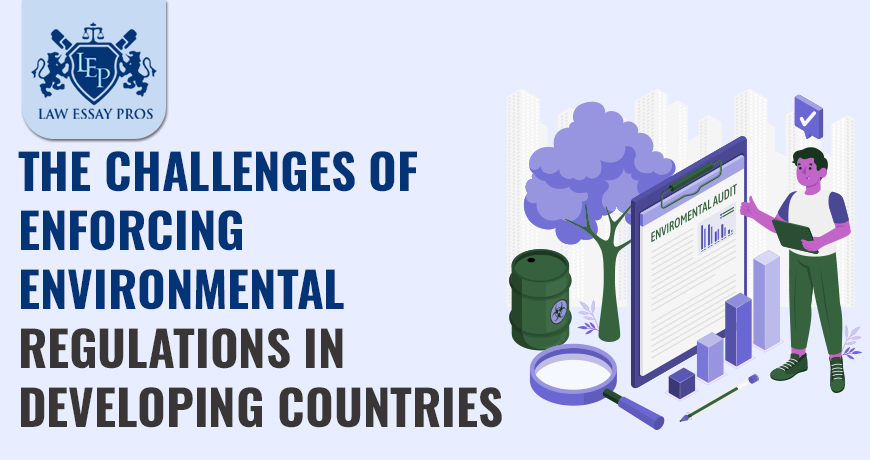
Although environmental protection is becoming more and more important worldwide, it is still very difficult to enforce environmental laws, particularly in developing nations. Even though many of these countries have made progress in creating environmental laws, a number of challenges frequently prevent laws from being effectively implemented. Developing sustainable solutions that create a balance between environmental management and economic development requires an understanding of these issues.
Our law assignment writing service will guide you in understanding the main obstacles that developing nations encounter when attempting to enforce environmental laws.
People all across the world, particularly those in developing nations, rely heavily on the environment for their financial support and health. The essentials of life, such as food, water, and air, are provided by a healthy environment. It also supplies the tools to manage natural disasters and resources for economic growth. The condition of the environment and the opportunities are frequently associated with the prosperity of developing nations.
Environmental laws have not always been realistic, either because they lack institutional support and effective tools or because they are too challenging or unrealistic in some ways. With the help of law assignment help professionals, you can understand the complexities of this topic more clearly.
Some environmental regulations have failed because they do not take into consideration the institutional capabilities of the society that must implement them or because they do not align with the technical requirements and economic realities of the nation or region.
But globally, many inter-connected environmental issues have been worsening recently. They include:
Air and water pollution: Common sources of air pollution include motor vehicles, industrial systems, household fire devices, and forest fires. Industries and industrial sites worldwide mostly cause water pollution. Waste from industry causes and includes:
Marine Dumping.
Sewage and Wastewater.
Oil Leaks and Spills.
Agriculture.
Global Warming.
Radioactive Waste.
Plastic Pollution: The collection of plastic items and particles is known as plastic pollution. G. plastic particles, plastic bottles, and bags) in the environment that negatively impacts people, animals, and their habitat.
Deforestation: Another major cause of environmental problems is deforestation, which occurs from the shocking rate at which trees and forests are being lost. Because they sustain the earth's temperature and give us oxygen and other raw materials, trees are extremely important to humans. However, the earth's climate has drastically changed as a result of human beings destroying trees and forests for commercial purposes.
Biodiversity Loss: Biodiversity loss happens when plant or animal species disappear completely from Earth or when there is a decrease and disappearance of species in a specific area. The decrease can be temporary or permanent.
Food Waste: Most of the food produced annually is wasted in a world where hunger is killing people. Food waste seriously harms our environment and makes food insecurity worse.
These factors cause many deaths, diseases, and disability worldwide, particularly in developing countries. These are just a few of the topics that cause environmental pollution, and there are many other reasons as well.
The main obstacle that countries usually experience is because of:
Absence Of A Government’s Policies
In developing countries, strong control agencies frequently lack, which makes it challenging to supervise and enforce environmental regulations. Government agencies that deal with environmental protection usually suffer from a lack of funds, staff, and technical expertise.
These systemic flaws limit effective regulation enforcement. Even the most thorough environmental laws may not be effective in the absence of a strong institutional framework.
Weak Public Awareness
Effective environmental regulation requires both community involvement and public awareness. Public involvement in regulatory processes is restricted in many developing nations due to a lack of knowledge and understanding of environmental issues. There may be less pressure on businesses and governments to follow regulations if citizens are not aware of their rights or the environmental laws that protect them. Increasing enforcement can be greatly supported by empowering communities with encouragement and education.
The Weak Judicial System
The judicial system is essential to the enforcement of environmental regulations. However, judicial systems frequently lack financial backing and are inactive or influenced by politics in developing nations. The obstacle effect of environmental regulations may be compromised by inconsistent rulings and delays in legal proceedings. Improving enforcement results requires enhancing the independence and capability of the judiciary.
Economic Confidence on Polluting Sectors.
Mining, agriculture, and manufacturing are just a few of the industries that greatly contribute to environmental pollution in many developing nations. Strict commitment to environmental laws may be seen as a danger to job creation and economic expansion. This trust puts economic growth and environmental sustainability at risk, which results in free enforcement or freedom for particular sectors.
To solve these problems, a complex approach involving collaboration at the local, national, and international levels is required. Some of the solutions are:
The Foundation of Capacity
Supplying resources and training to regulatory organizations in order to improve their technical know-how and capacity for enforcement.
Public-Private Collaborations
Encouraging self-regulation and sustainable business practices through market-based solutions and incentives.
Participation Of The Public
Educating the public and encouraging local communities to be alert and report environmental infractions.
Change In Constitution
Updating and adjusting environmental laws to improve enforceability, close gaps, and define standards.
Conclusion
Even though there has been progress in creating legislation and increasing awareness, there are still many obstacles to overcome. Developing countries can take a more balanced and sustainable approach to environmental preservation and economic growth by tackling these issues with focused reforms and international collaboration.
Our law assignment writing service UK has helped many students write critical and analytical legal essays and detailed assignments on these subjects. Students who plan to work in this area of law make some legal contribution to the formation of environmental law and could easily get assistance from our service. They will be provided with acclaimed research-based legal data that will help them understand better and work on it with necessary support from the law to make them worthy and valuable for their future career-oriented endeavors.